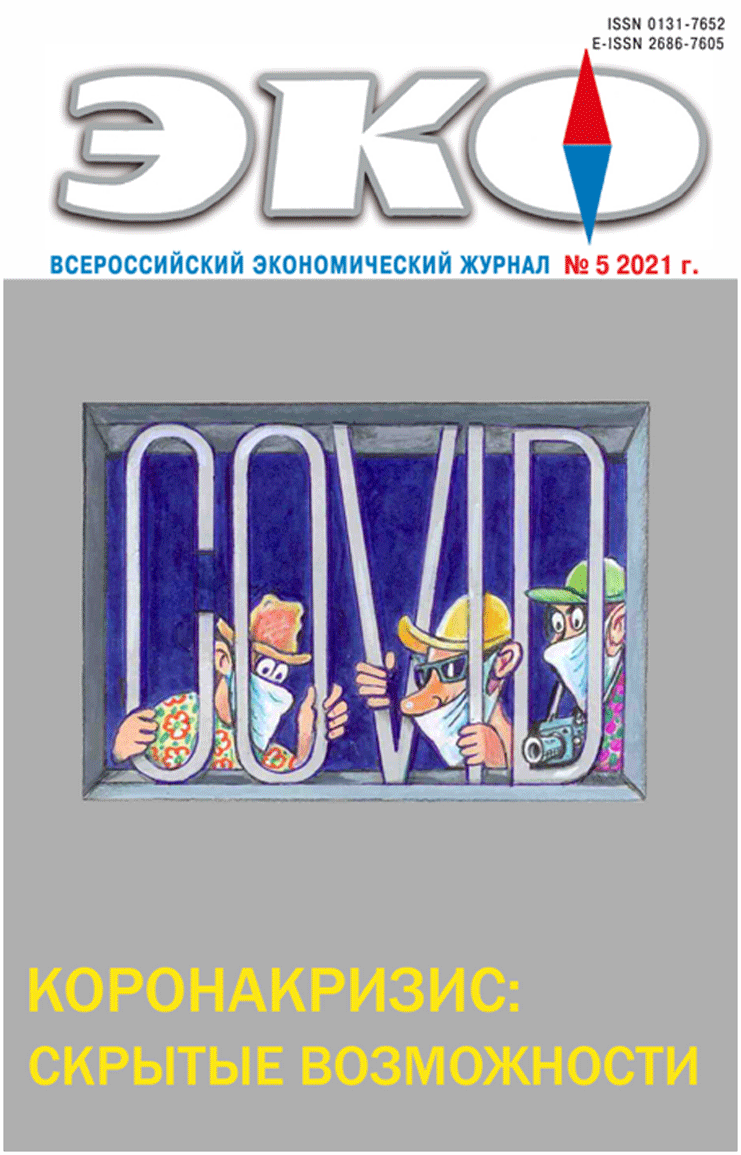Тема номера: Коронакризис: скрытые возможности
A Crisis or New Reality: the Impact of COVID-19 Pandemic on the Russian Tourism Sector
Published 2021-05-05
Keywords
- Russian tourism sector,
- COVID-19 pandemic,
- economic crisis,
- anti-crisis policy,
- domestic tourism
- regional development ...More
How to Cite
1.
Yakovlev А, Balaeva О, Predvoditeleva М, Misihina С, Ershova Н. A Crisis or New Reality: the Impact of COVID-19 Pandemic on the Russian Tourism Sector. ECO [Internet]. 2021 May 5 [cited 2026 Jan. 25];51(5):53-76. Available from: https://ecotrends.ru/index.php/eco/article/view/4247
Abstract
This paper evaluates the impact of the crisis caused by the COVID-19 pandemic and measures of the state anti-crisis policy on the Russian tourism sector, as well as opportunities and directions of its development. The study is based on the results of a series of semi-structured interviews with owners of firms and heads of key business associations in this sector. The analysis showed that, on the one hand, the crisis has exacerbated the problems that have long been brewing in the Russian tourism sector. On the other hand, the shift in demand to domestic market due to restrictions on international travel provides a real opportunity for the development of the domestic tourism segment. Should the federal and regional authorities, in cooperation with the tourism business, use this window of opportunity, it could help provide the necessary incentives for the inflow of investments into the Russian tourism sector and contribute to the socio-economic developmentof the regions.References
- Романова Г. М., Шарафутдинов В. Н., Онищенко Е. В. О гипотезе новой парадигмы управления развитием туризма в рамках национального проекта «туризм и индустрия гостеприимства» // Рекреация и туризм. 2020. № 4 (8).
- Romanova, G.M., Sharafutdinov, V.N., Onischenko, E.V. (2020). On the hypothesis of a new paradigm for managing the development of tourism in the framework of the national project «Tourism and hospitality industry». Professorskiy zhournal. Serija: Rekreatsiya I turizm. No. 4 (8). (In Russ.).
- Чудновский А. Д., Жукова М. А., Кормишова А. В. Теория и методология социально-экономических исследований в туристской индустрии. М.: Кнорус, 2013. 480 с.
- Chudnovskiy, A.D., Zhukova, M.A., Kormishova, A.V. (2013). Theory and methodology of socio-economic research in the tourism industry. Moscow, Knorus Publ. 480 p. (In Russ.).
- Alam, M.S., Paramati, S.R. (2016). The impact of tourism on income inequality in developing economies: Does Kuznets curve hypothesis exist? Annals of Tourism Research. Vol. 61. Pp. 111–126. DOI: 10.1016/j.annals.2016.09.008
- Canh, N.P., Thanh, S.D. (2020). Domestic tourism spending and economic vulnerability. Annals of Tourism research. Vol. 85. DOI: https://doi.org/10.1016/j.annals.2020.103063
- Khalid, U., Okafor, L.E., Burzynska, K. (2021). Does the size of the tourism sector influence the economic policy response to the COVID-19 pandemic? Current Issues in Tourism. DOI: https://doi.org/10.1080/13683500.2021.1874311
- Pardo, C., Ladeiras, A. (2020). Covid-19 “tourism in flight mode”: a lost opportunity to rethink tourism – towards a more sustainable and inclusive society. Worldwide Hospitality and Tourism Themes. Vol. 12. No. 6. Pp. 671–678. DOI: https://doi.org/10.1108/WHATT-07–2020–0064
- Rodrik, D. (2004). Industrial Policy for the Twenty-First Century. Harvard University Faculty Research Working Paper Series. RWP04–047. November. DOI: http://dx.doi.org/10.2139/ssrn.617544
- Sabel, Ch., Jordan, L. (2015). Doing, Learning, Being: Some Lessons Learned from Malaysia’s National Transformation Program. Competitive Industries and Innovation Program. World Bank. Washington DC. January. URL: http://documents1.worldbank.org/curated/en/464231565116506887/pdf/Doing-learning-being-some-lessons-learned-from-Malaysias-national-transformation-program.pdf (accessed 26.03.2021).
- Yeoman, I.S. (2020). COVID_19 means the future of tourism is a blank piece of paper. Journal of Tourism Futures. Vol. 6. Iss. 2. P. 119. DOI: https://doi.org/10.1108/JTF-03–2020–0044

